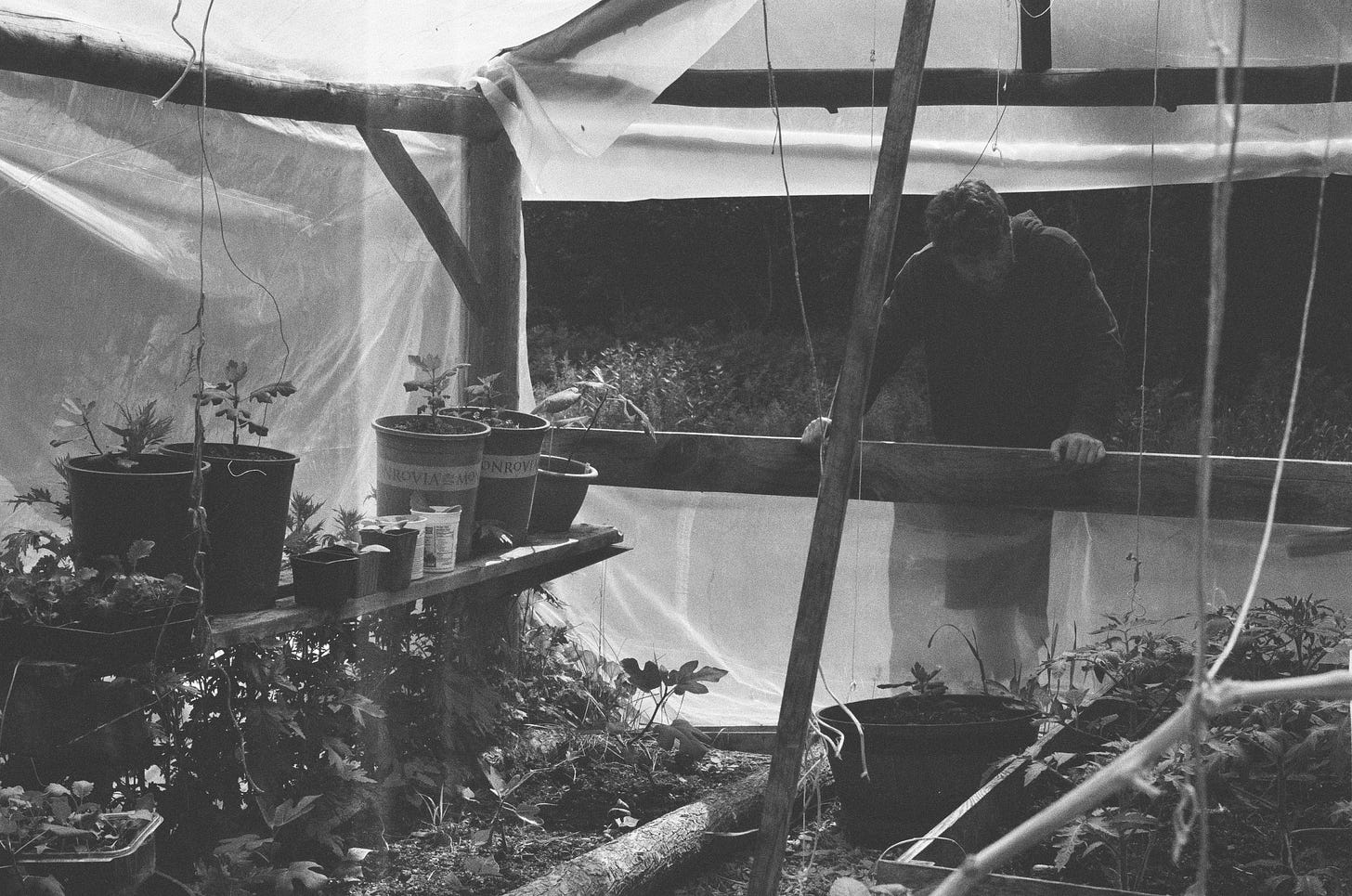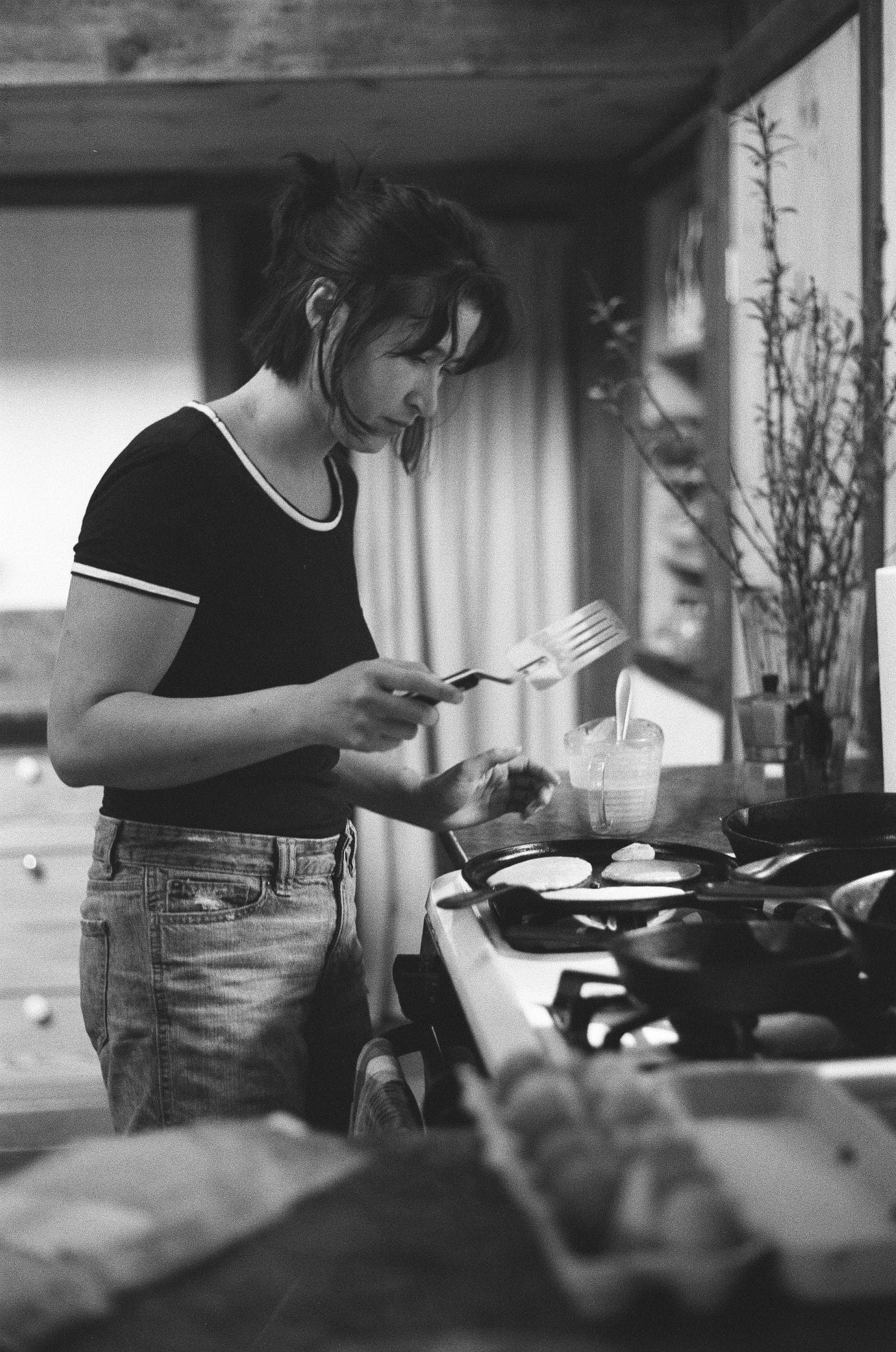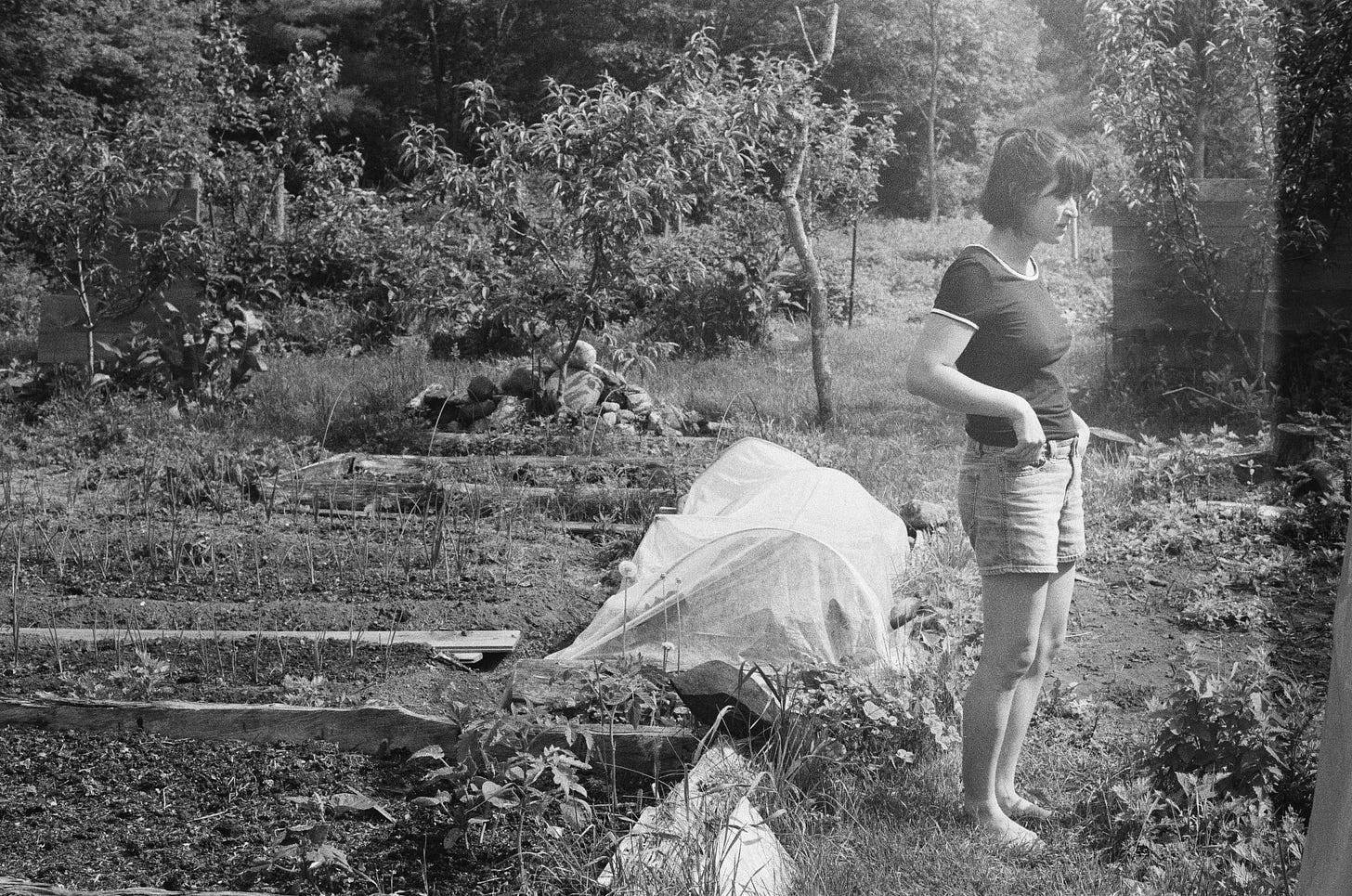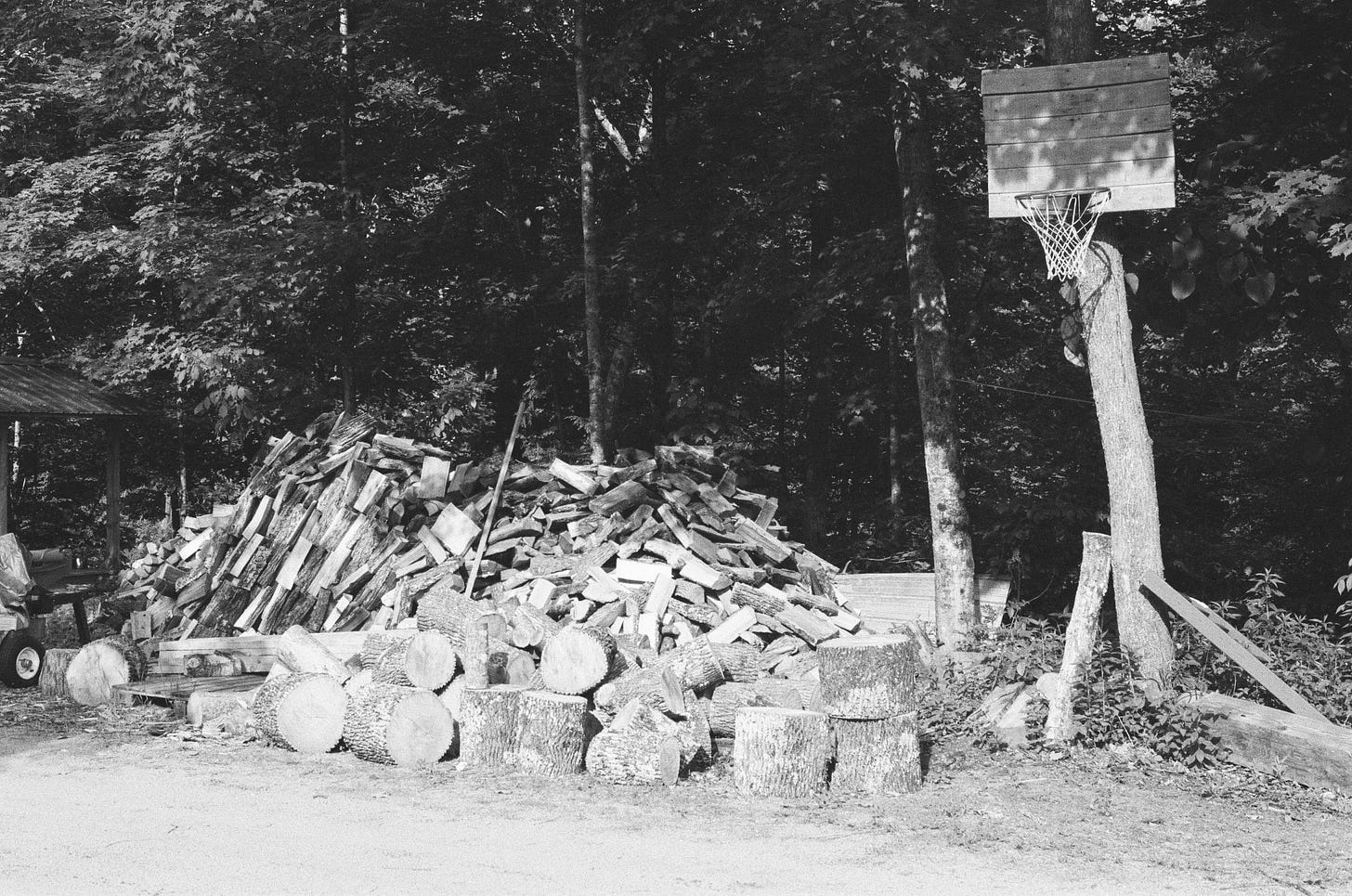On my drive up to Quebec in June, I visited a childhood friend who lives in upstate New York. My time with her and her partner on their small piece of land felt worthy of reflection. I found their lifestyle rewarding and particular, at least to my city-dweller eyes.
This short portrait of their lives, drawn from passing moments early in summer, is romanticized and partial. Take it as a quick impression of what is no doubt a full, complicated existence.
As mentioned, this will be my last post for a little while. I’ll send a mail once I get back on the blogging horse. Vi ses snart — see you soon.
Cliff doesn’t know where the wild turkey legs have come from.
He shakes his head, hands in the air before him, as if holding a box, spinning up an explanation he can’t quite grasp.
Mae stares at him from the kitchen as she hacks off hunks from the mysterious meat with a dull knife.
“How do you not know where they are from?” she quizzes in faux exasperation.
“Ah, well,” Cliff haws, “I know where they came from… It’s just, just… complicated.”
We laugh, appreciating Cliff’s talents, those of a woodsman. He barters, he scavenges, he hunts. The turkey legs could be from any source. Or all three.
Served with white rice and spicy greens from the garden, they make for a full, if not spartan meal.
“We normally eat better than this! I promise!” Mae exclaims multiple times as we saddle up to a small table in the main room of their modest farmstead in the New York North Country.
I sit on a wooden hunk of furniture (not a bench and not a dresser) that’s been dragged close to the table. The meal is self-serve, so I scoop a healthy portion onto my plate. No music plays in the background, and a jug of water is all we have to drink.
Joking behind a wall of stoicism, Cliff mumbles, “At least I'm pretty sure this is turkey.”
***
Mae is ambiguously aged with short dark hair, grungy overalls, and well-worn sandals. She sits at her laptop listening to snippets of radio clips, occasionally letting out soft expletives (“ah, dang it!”). Twice, she crushes me in Scrabble with half her attention elsewhere. In high school, she was told she would be “even more annoying” if she started drinking coffee. The sound of the ribbit-ing frogs fills her with glee.
Cliff is weathered. Wild strawberry hair and beard frame a furrowed brow and tight jaw. He stomps around the yard with industrial headphones, peeking every few minutes into his newly constructed chicken coop to see if the chicks are too warm or too cold. Recently, he and his dad ventured up to St. John’s, Canada to set up the flatwater canoeing course for the Canada Games. What that entails, he doesn’t divulge.
***
I’m awake at 6:45 and crusty.
The Au Sable River chatters below thanks to last night’s rain. Its pebbled run kept me company as I slept, if only for a few hours, in the tiny house Mae built.
I peel myself out from under my eye mask (the light comes early this time of year) and over to the main house, where Mae scrambles into a pair of jean overalls. We are to hike a mountain before she begins her work day at a local news organization.
“What do you normally drink in the morning?” she asks.
“Just coffee, usually.”
“Ooooh, sorry, we don’t have any of that,” Mae replies, like a polite waiter dismissing an unreasonable customer’s request.
“Black tea, maybe?”
“Yes, we have that! I just recently got into black tea.”
She makes me a cup, but I have to pour most of it down the drain so we can make our early morning date with the Adirondacks.
Not five minutes after meeting Margot and Alex I was naked in their sauna, simmering in my own juices. Margot lounged comfortably on the top roost as she described building the sauna during the pandemic. Comfortable enough to fit eight with ample room on its hot slats, the hut was her place to reset after a stressful day feeding pigs, making cheese, operating a farmstand, and raising a family.
Outside, they’d placed an enamel bathtub and filled it with frigid water and mint leaves to refresh between sauna bouts. I lived long enough in Scandinavia to welcome the ritual of sauna, and to become accustomed to nudity practiced in a tight, dark, hot shed filled with other bodies. Still, I felt a tinge of embarrassment at the prospect of saunaing in the United States, a place where public nudity remains taboo. I thought the others might share in my American abashedness, but no, Mae and Cliff stripped with quick comfort, and I was forced to overcome my homegrown insecurities.
Mae and I grew up together in Cedar Park. Our families mirrored one another; four of us, four of them — tight cohorts of little brothers and big sisters, techie fathers and teacher mothers.
All of us attended the same church, Unity Church of the Hills in Austin. Unity is a new-age religious community light on Jesus but heavy on spirituality, a Texan mega-church for reformed hippies. Each Sunday, we’d drive down Highway 183 through the church’s massive concrete arch to attend service. My mom watched the toddlers while Mae’s mother played piano on stage and our dads ran the church’s sound and lighting production. After the show, we’d all load up into our respective minivans and meet for lunch at the Chipotle on 183 heading back to Cedar Park (I remember the Chipotle more than any talk of God. Unity’s spirituality didn’t do much for me).
Suburban spirituality felt a long way away as Margot, Mae, Cliff, and I left the sauna, yet stark naked, to run up the hill and appreciate the twilight pastures below, careful to check for ticks lusting after an easy meal. Their farm dog bounded through the long grass as the moon blossomed overhead. Margot then took us inside and fed me homemade rhubarb crumble as we leaned around their farmhouse kitchen island. Such ease of existence. Such comfort.
I suppose I find Mae’s current life noteworthy because I know from where it came. As with few others, I have an intimate knowledge of the building blocks of her upbringing. The church, the family, the school. The ingrained taboos.
To take those rudimentary blocks, then, of suburban Austin and Sunday school, and end up a homesteader in the rural Adirondacks… well that’s a surprise. A good surprise. A surprise won from agency on Mae’s part, no doubt.
Earlier that day, as Mae and I shopped for organic sheep yogurt at the nearby farmstand, I asked my old friend about how she’d come to this exceptional life. Mae balked at my framing, claiming, “It’s just about priorities. I prioritize being able to swim in a river every day. Other people prioritize different things.”
There’s more to it than that, though. Mae is conscientious about the lifestyle she has chosen. In that manner, I sense the spiritual residue of our childhood in the church. The protestant influences we once shared have faded but another aspect remains. We were taught to relish in the oneness of everything, a connectivity to our shared “godliness.” We didn’t talk about god (so I won’t put words in her mouth), but I judge that Mae has brought elements of that connectivity with her as she settled in the North Country. Her home has a fullness of spirit that is missing in the lives of us alienated folks.
***
The garden lies north of the main house. Wildfire smoke blown in from Alberta covers the air in a thin layer of grit. The scent of sawdust mixes with turned soil.
In the first tilled plots are shooting garlic and covered broccoli. Behind them, boxes of mustard greens, kale, chard, and radishes. The greenhouse is to the east and full-up with tomato varietals and fledgling fig trees. A few young peach trees (only recently propagatable in the North Country) serve as the basis of a future orchard. Last year, they produced nine peaches.
***
The separation I feel while stepping into the lives of others cuts deep and shallow. It is reflected both in big decisions and micro-practices. To say Mae and Cliff have a different lifestyle to mine would be an incomplete statement. The separation is larger than that. They have a totally different way-of-being.
If you’ve ever spent a weekend with a friend’s family, you’ll know what I mean. As a guest among another’s family, you feel alien. They are normal people, this family, surely, but they follow a different set of rules from your own. One might notice that they set the dinner table an hour before eating, or that they loiter, nibbling at leftovers and chit-chatting. Maybe they idly hug one another, or all read silently in the same room. Each family, each person, has a unique pattern of moving, not-moving, and moving again. Such small practices give clue to their way-of-being.
I am never bored while witnessing a new way-of-being. However quaint or slovenly someone’s life might be, the cadence of a person’s home will always fascinate. Even an old friend’s.
Mae and Cliff’s way-of-being is rooted in a closeness with their surroundings. They prioritize what is before them. They regard the well-being of their immediate neighbors. They eat what can be sourced locally. They entertain themselves through building, growing, fostering, and sharing. They don’t play music as background noise. They swim in the river.
***
Cliff makes waffles on my last morning on the farm. Thick, proud waffles made from gluten-free mix that Mae orders in special from the bulk-buying club run by Cliff’s mom. On top: homemade syrup, fresh strawberries, and a banana for good measure.
I offer to make Cliff some coffee in my micro-moka pot, but he declines, saying, “No thanks, it makes me go all…” He makes a vague gesture with swirling arms.
His loss. The earthy bitterness pairs well with the river of syrup on my waffles.
Between bites as they make more, I sketch out a haiku:
In my waffle’s wells
Maple flows to each cranny
The brim, never found








So much to love about this writing, but oh that haiku was the cherry on top... The brim, never found.